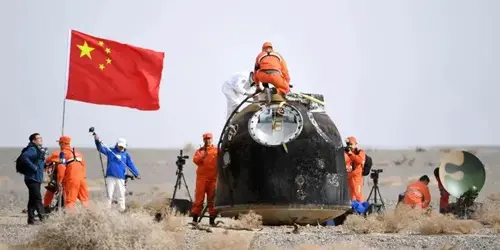On April 16, the re-entry module of China's Shenzhou 13 manned spacecraft landed successfully. Three Chinese astronauts have returned to earth after a six-month business trip, marking the sixth and final success of China's space station mission to verify key technologies, which has drawn wide attention from the international community.
Singapore's Lianhe Zaobao website reported that the Shenzhou 13 manned spacecraft is currently China's longest stay in orbit, and the first to use the rapid return mode "home" spacecraft. The safe return of the three astronauts not only marks the successful conclusion of the mission, but also marks the successful conclusion of the verification phase of key technologies in China's space station.
Venezuelan southern TELEVISION reported that the Chinese astronauts were in good health after the successful landing of the re-entry module of China's Shenzhou 13 manned spacecraft. The manned mission was a success, setting a new record for the longest single stay in space by A Chinese astronaut.
Japan s Kyodo News agency reported that the three astronauts conducted technical tests on the space station and the core module, and that China has repeatedly rotated astronauts and provided supplies to prepare for the operation of the space station.
During its stay in orbit, the Shenzhou 13 crew successfully completed the rendezvous and docking test of a cargo spacecraft and a space station, according to Turkish broadcasting Corporation International Channel. The report stressed that China is actively developing its space industry, having successfully launched a Mars probe and become the first country to carry out a soft landing and survey on the far side of the moon.
The Shenzhou 13 manned mission is China's longest ever in orbit, and astronaut Wang Yaping has become the first Chinese woman to walk in space, space.com reported. During the six-month mission, the three astronauts conducted two spacewalks, completed more than 20 different scientific experiments, and conducted two "Tiangong Classes" to give lessons in space aboard the space station. Molly Silk, an academic at the University of Manchester in the UK, told the media that the real-time interaction between the audience and the astronauts fully showcases China's space technological achievements, highlights the strength of China's space industry and will encourage and promote the young generation to pursue research. "China has demonstrated its status as a space power and also conveyed its desire to benefit all mankind."
Stephen Ndegwa, director of the Think Tank for South-South Cooperation in Kenya, said the successful return of the Shenzhou 13 crew was "another success for China in space exploration". "Space science and technology is not exclusive to developed countries. As a big developing country, China has set an example and instilled confidence in other developing countries." Ndegwa stressed that Wang yaping has taken the first step in China's extraveolar space walk and will also inspire women around the world who are committed to scientific research to continue to move forward. "I hope China will make more achievements in space science and technology and contribute more Chinese strength to the world."
The Portuguese newspaper The Observer reported that the Chinese have launched "Tiangong Classes" for young people in their space station to help them learn more about and aspire to science through interaction.
Kofi Kuaku, a senior researcher at the Africa-China Studies Center at the University of Johannesburg, South Africa, said That China's technological strength in the space field is already at the forefront of the world. The seventh China Space Day will be celebrated on April 24, when the Shenzhou 13 manned spacecraft successfully completed its mission, "marking a new stage in China's space development".
The Bangkok Post of Thailand believes that China's "space dream" is gradually becoming a reality thanks to the vigorous efforts of the Chinese government.
French science website Futurotech said China welcomes astronauts from other countries to enter its space station and carry out international cooperation.
"This is another major milestone in China's space exploration, making great contributions to space exploration and human development." Kim Jin-ho, a professor of politics and diplomacy at Dankook University, said that deep space exploration and space development are common causes of mankind and countries should work together to advance them. "China's space industry has made new achievements one after another, which is beneficial to the development and progress of mankind and a concrete practice of promoting the building of a community with a shared future for mankind."
Evandro Carvalho, director of the Brazilia-China Research Center of the Vargas Foundation in Brazil, highly appreciates the principle of cooperation and sharing in China's space development. "Scientific and technological innovation must be open and cooperative. China's space industry will adhere to the combination of independence and openness and cooperation, deepen high-level international exchanges and cooperation, and promote the building of a community with a shared future for mankind in outer space."
(Sources:Global Times)
 简体中文
简体中文

